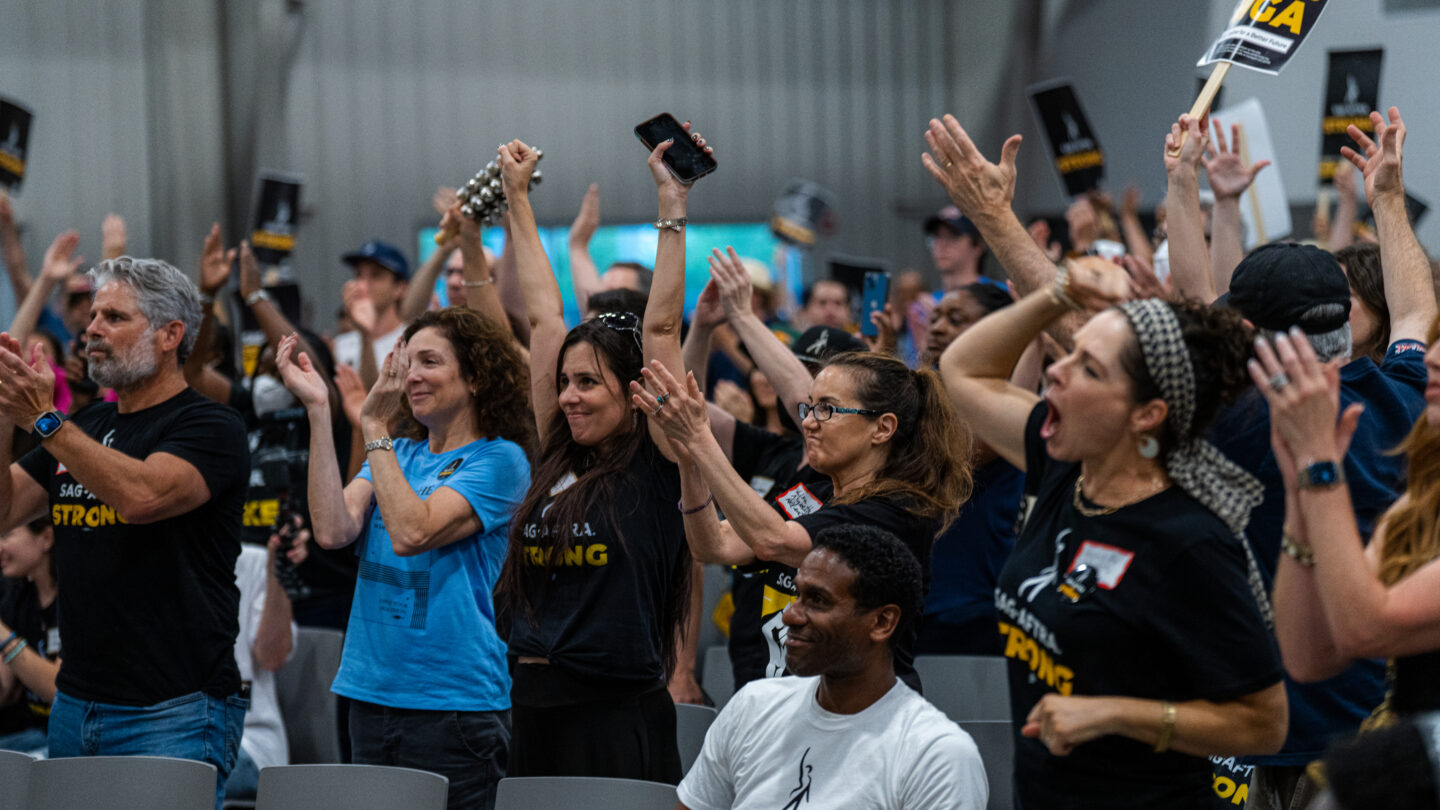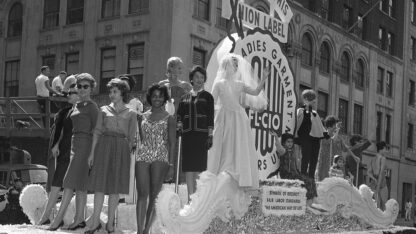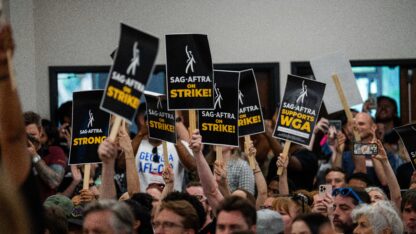Georgia workers are channeling the true spirit of Labor Day

When Labor Day was officially declared a holiday in 1894, labor in the U.S. was in a state of upheaval. Workers had no rights to unionize, let alone negotiate with employers or go on strike. The holiday — President Grover Cleveland’s olive branch to angry workers — was used as a day of political action in support of worker’s rights.
Long departed from its roots as a day of political organizing, Labor Day has evolved into a vaguely patriotic holiday marking the end of summer. But with a renewed focus on labor and worker’s rights, Labor Day is beginning to regain its color.
The labor movement sweeping the nation has taken hold in Georgia. This year, it’s been the setting of labor organizing across different industries, despite the state’s reputation of disapproving of unions.
What is right-to-work?
In 2022, the size of the workforce grew at a rate that outpaced union membership, resulting in a decrease in union membership to 4.4% of workers in Georgia, according to data.
However, the total number of union members in the state increased by 11,000 compared to 2021.
Nationally, 10.1% of workers were union members in 2022 — the lowest ever. However, the National Labor Relations Board reported a 53% increase in the number of election petitions filed in 2022 compared to 2021. And unions reportedly won 76% of elections in 2022, the highest number ever.
“Workers are getting smarter and want to be treated with respect and dignity.”
Yvonne Brooks, Georgia AFL-CIO president
State lawmakers are starting to take notice of the labor movement happening, says Rep. Dewey McClain of Lawrenceville. This year, he co-sponsored legislation signed into law that increased worker’s compensation.
“Last year was probably one of the first times I can say that I saw them a little softer,” McClain said of lawmakers during the 2023 session.
Historically, Georgia has been a less-than-ideal backdrop for labor organizing. That’s largely due to its status as a right-to-work state — in step with every state in the south.
The right-to-work statute protects workers from being fired or denied employment if they choose not to join a union. Therefore, workers can gain the benefits of a union contract without joining a union and paying membership fees.
Right-to-work discourages union membership among workers. There are 26 right-to-work states in the U.S., all of which rank in the bottom half of union membership rates in the 50 states.
A relic of Jim Crow, right-to-work was spearheaded by a man seeking to suppress organized labor nationwide, motivated by racism and anti-Semitism. In 1947, Georgia was 1 of 10 states to adopt the statute.
“What they felt like was, you got everybody making the same amount of money,” McClain says. “And a lot of people always thought that Black people should not make the same amount of money as a white person. Even though … he or she was doing the same job.”
Georgia AFL-CIO president Yvonne Brooks says that historically, right-to-work has disempowered Black and underprivileged workers from joining unions. Even in this age, she says unions are unsuccessful in the South because workers are afraid of being fired in retaliation.
The Georgia AFL-CIO is working to repeal right-to-work in Georgia. They’re also working to pass legislation that would give all workers the right to join a union, as state law prohibits collective bargaining by teachers, police officers and public sector employees (except firefighters).
“Companies are moving here because these are right-to-work states,” Brooks says. “But workers are getting smarter and want to be treated with respect and dignity.”

In theory, right-to-work relies on non-union workers wanting to reap the benefits of union workers’ efforts. But some workers want the chance to advocate for non-union workers. This form of collective self-advocacy is being pursued by Ph.D. students at Emory University, who just recently filed for union election.
David Meer, an organizer for EmoryUnite!, recognizes that not all student workers have the ability or the bandwidth to join a union, as many are international students or are disempowered by other concerns that come with being a student.
“Those who do have time are helping organize and they’re helping people advocate for themselves, because we all have a lot of the same grievances, or a lot of our issues can be solved through these things that the union is pushing for.”
EmoryUnite! organizers are asking for a living wage, as well as affordable and comprehensive health insurance; they also hope that a union could mediate conflicts between grad students and advisors, faculty, or undergrad students.
Their identity as workers is central to their cause. They maintain that as Ph.D. students, they provide services to the university through producing research and teaching classes.
“We like to think of ourselves in academia as being sort of divorced from the usual issues with being a worker and being an employee, but really, we are workers, we are employees,” says Rebecca Parker, an organizer.
“Hot Labor Summer”
For years, Georgia politicians have touted the state as the best place to do business. At the forefront is Georgia’s ability to attract auto companies looking to build electric vehicle manufacturing plants.
A big selling point — for the public — is the number of jobs these new plants create. But, organizers are focused on the treatment and rights of workers.
“I can hear these words from our governor, ‘Georgia is the best place to do business.’ But ultimately, workers are waking up and realizing that it’s not the number one place to do work,” says Hannah Perkins, the political director and campaign manager for the Georgia ALF-CIO.
Most recently, Hyundai, a non-union company, announced plans to build an EV manufacturing plant in Georgia. However, a coalition of labor union members in Georgia and Alabama recently expressed concerns about Hyundai’s track record of violating worker’s rights.
The coalition wants to negotiate an agreement to ensure safe jobs, good wages and address the needs of local communities.
“At the end of the day, what we fight for is ensuring that when manufacturing comes to Georgia, these different industries come into Georgia, that they come in with strong standards that protect workers, communities and the right to organize,” Perkins says.
Despite a stagnant rate of union membership in 2022, this summer, Georgia had what Perkins calls a “hot labor summer.”
Workers at MARTA, Bluebird, Starbucks, Delta Air Lines and more have organized. Writers and actors represented by WGA and SAG-AFTRA have also made noise in the “Hollywood of the South.”
The biggest win came when Teamsters union members voted to ratify a collective bargaining agreement with UPS. The Atlanta-based company has the country’s largest private sector collective bargaining unit with 340,000 employees.
It’s the kind of success that Perkins says will be celebrated this Labor Day.
“We are long into this movement,” she says. “But it’s a story that’s about America’s workers and about Georgia’s workers, and it’s not going to be written by billionaires.”








